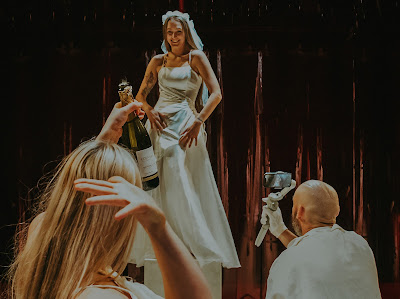WHEN: 16 - 26 August 2023
WHERE: Theatre Works (Explosives Factory)
WRITTEN BY: Delta Brooks, Rebekah Carton, and Harry Haynes
DESIGN BY: Juliette Whitney
LIGHTING BY: Nicholas Moloney
SOUND BY: Miles O'Neil
PERFORMED BY: Delta Brooks, Rebekah Carton, Tom Richards, and uncredited ensemble.
 |
| Delta Brooks, Rebekah Carton, and Tom Richards - photo by Matto Lucas |
I think one of the great truths being revealed in the 21st century is that our understanding of women - who we are, how we behave, what we feel and experience - has historically been man-washed by the great creative writers and artists of Western History. In a desperate rush to scream 'we are human in all it's good and bad' playwrights are looking back at iconic historic/mythic female characters and ripping off the Eve mask to see the flesh and blood of what must have really been going on. The latest in this zeitgeist is Cygnets being presented by The Liminal Space at the Explosives Factory until 26 August.
Clytemnestra and Helen are two such iconic women. They are twin daughters (or quads if you include their brothers Castor and Pollux) born from an egg laid by Leda who had been raped by Zeus when he took the form of a swan. (Those Greeks really like to make their mythology complicated!). Both daughters went on to marry kings (Agamemnon and Menelaus respectively) who were important players in the epic poems of Homer.
It seems to be standard fare in Greek mythology that women begin all their relationships with rape and in Cygnets Delta Brooks, Rebekah Carton, and Harry Haynes explore what that really means for these women and their familial relationships. Being the result of rape, how bonded was Leda to her daughters and how do those daughters choose to remember her? Playing lovingly as little girls, how damaged was their sibling relationship after Helen was abducted by Theseus? Was she the same little girl when she was returned to her family?
In particular, in Cygnets Brooks and Carton explore their sorority. They play as little girls and move on to joint pre-wedding celebrations as both girls prepare to marry their kings. They settle into their fates and all the while Tom Richards is circling with his video phone, watching them and live streaming onto screens for the audience to watch. Do you want to watch them through his gaze or look at the real women in all of their totality? You get to choose in Cygnets - sometimes.
It really helps to know something about who these mythic women are to fully appreciate Cygnets. In particular, the journey of Helen is painful and magnificant. Without recounting the story of Helen of Troy, Brooks and Carton manage to expose all the ugliness she must have held inside of her as a result of the traumas inflicted. In Cygnets they make them part of her external visage. This 'face which launched a thousand ships' (as cited by Christopher Marlowe and, earlier, by Lucian) becomes a slobbering drunk with matted hair and cake smashed over her face, her body covered in rivers of blood - menstral, but also the blood of the men who died in the battle of Troy.
As she poses opposite Richard's perfect David, Brooks cries out "I am not yours to die for!" Just as Eve is blamed for eating the apple and getting everyone thrown out of Eden, Helen is blamed for the war at Troy. Once again men blame women for their own mistakes, atrocities and weaknesses. Helen was just a woman. A woman raped. A girl abducted. A child spurned.
Carton's Clytemnestra is less transparent than Brooks' Helen. The start of her reminiscences with Helen are full and engaging, but after her marriage to Agamemnon it becomes opaque. There is no reference to her first marriage, and no significant reference to the fate of her daughter Iphigenia. They do speak about her murders (Agamemnon and Cassandra) but we don't really see the journey towards that or impact thereafter.
What we see of Clytemnestra is a development into someone hard and uncaring towards her sister although how and why this happens is unclear. At one point Helen tells Clytemnestra she thinks she is pregnant and Clytemnestra says 'Don't be silly!' and then becomes quite aggressive. I don't get it because Helen had children so it is not as if she was making a false claim...Anyway, my point is I lost my place in Clytemnestra's story at that point and it never really seemed to go anywhere which is a bit of a shame.
Beyond that I really loved this production. It begins with a live art element for the audience to explore, juxtaposing Ancient Greek iconography with modern costume items and living bodies (the uncredited ensemble). Juliette Whitney (designer) has created a stunning aesthetic of white and red and Nicholas Moloney has lit it well despite the constraints of traverse staging. I loved the choice of the traverse by Haynes (director) which emphasised the public gaze on these tragic women just trying to live their lives. The power of Whitney's design is coupled with the driving force of Miles O'Neil's sound design.
Nothing in this space is comfortable, but everything has impact. Everything is beautiful, but nothing is pretty. Cygnets is a story about women. It is about the person behind the visage. It speaks to celebrity today through celebrity of ancient times. It speaks about women as people, not as icons. It shows women unveiled from the male gaze. It shows us.
4 Stars

No comments:
Post a Comment